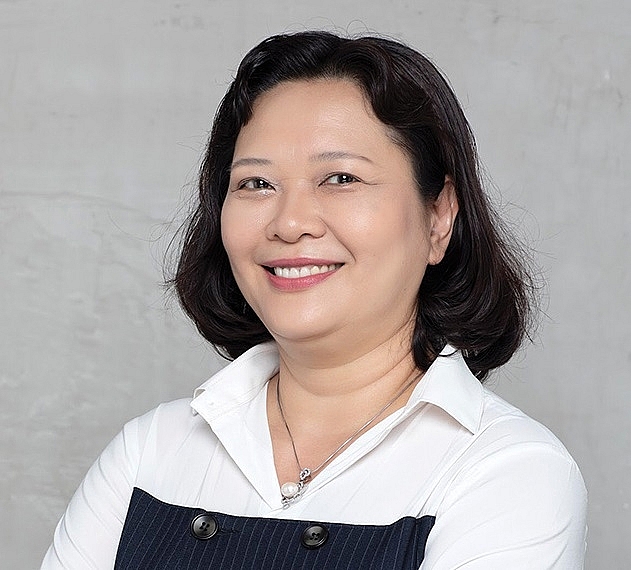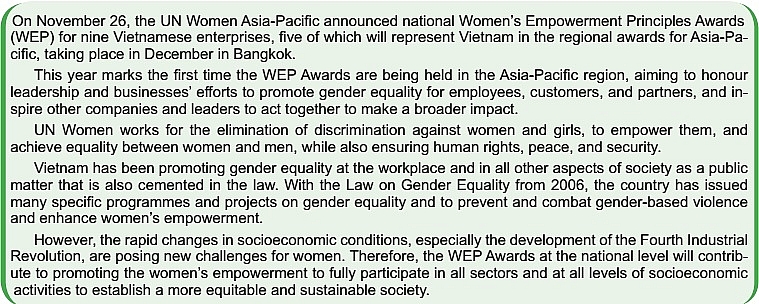Empowering women at top of Nestlé Vietnam agenda
How did Nestlé Vietnam prepare for and win in the categories Gender-inclusive Workplace and Gender-responsive Marketplace at this year’s Women’s Empowerment Principles Awards?
 |
| Truong Bich Dao, HR director at Nestlé Vietnam |
In 2013, Nestlé Group committed to implementing the Women’s Empowerment Principles with a 7-step business plan to strengthen gender equality and empower women to fully participate in all economic activities at their workplaces and their communities, thereby contributing to not only improve their lives but also those of their families and society as a whole.
Since then, the company has strived to promote gender equality and empowerment in its activities across the company’s value chain, following the philosophy that women in any position play an important role and are complementary to the strengths of men, thus bringing success to the company and the whole society.
How does Nestlé empower female workers more in everyday business?
Gender equality principles are guiding all of Nestlé’s human resources activities, from recruitment and succession planning to promotion. Over the years, the proportion of women holding senior management and leadership positions at Nestlé Vietnam has increased year by year. Women have now also surpassed the number of male colleagues on the Board of Directors with 55 per cent of its members being female. All positions, including those jobs previously assumed to be occupied by only men, are also held by female employees, which includes the management level.
The necessary awareness of gender equality, together with specific policies and implementations are a part of Nestlé’s operations, not just in Vietnam. Nestlé always supports, encourages, and empowers women. Therefore, right at the recruitment process, the company ensures that half of all new employees are female candidates.
When working at Nestlé, employees can develop and be promoted equally, regardless of their gender. Furthermore, the company has a clear welfare policy which, for example, for female employees includes taking full 5-month maternity leave. Meanwhile, male workers are given 2-4 weeks of leave to take care of their family after the partner gives birth.
Moreover, Nestlé offers female employees with children under one year to take one hour off earlier a day or a complete day off per week to suit their circumstances. During the social isolation period earlier this year, all female workers with children under one year could work from home to ensure the safety of both.
Where does Nestlé’s focus on women come from?
There are many factors and qualities of women that come to play, such as their meticulousness and commitment in the corporate context. Thus, during our operation, we intentionally aim to develop in making the best use of these qualities.
Vietnamese women need to be treated fairly and we perceive them as tough and try to use this feature to our advantage. Following the parent company’s orientation, we try to include women in all the company’s activities. Currently, most of Nestlé Vietnam’s distribution network owners are women.
Even through the Nescafé Plan project in Vietnam, Nestlé has contributed to enhancing the management role of women, especially female farmers. The project, which has been implemented since 2011, has trained a team of female farmers’ in leadership who now impart their farming knowledge and experience to others.
 |
What challenges does Nestlé Vietnam face in empowering women?
There are certain challenges. Outside of work, women are busier taking care of their families and homes. Therefore, the company has organised training courses, not only for female workers but also males, to better support women in their families.
This point of view is even evident in the company’s product lines and marketing. With this, we hope that women have more time to look after themselves, to be themselves, and to participate more in social life outside of family and work.
Meanwhile, the men in the family also can share some of the housework, cook, and take care of the children, while creating bonds with other family members.
Nestlé is seen as a role model when it comes to women empowerment. Why do you think this approach has not yet become popular in Vietnam’s business community?
I think it takes time to replicate such an approach. For example, when a company needs a female leader, they will need time to select and train them. Nevertheless, more and more Vietnamese corporations employ female CEOs, which fills me with pride. So, I think Vietnam is on the right track.
What the stars mean:
★ Poor ★ ★ Promising ★★★ Good ★★★★ Very good ★★★★★ Exceptional
 Tag:
Tag:
Themes: Empowering Women
- Female influence still to be attained
- Shaping Vietnam's corporate future: female board members show business excellence
- Nestlé Vietnam contributes to elevating the role of women across the supply chain
- Empowering female leaders in tech: insights and aspirations shared at KPMG Tech Innovator 2023
- Brighter Path programme hosts empowerment meeting for ethnic minority girls
Related Contents
Latest News
More News
- 14th National Party Congress wraps up with success (January 25, 2026 | 09:49)
- Congratulations from VFF Central Committee's int’l partners to 14th National Party Congress (January 25, 2026 | 09:46)
- List of newly-elected members of 14th Political Bureau announced (January 23, 2026 | 16:27)
- 14th Party Central Committee unanimously elects To Lam as General Secretary (January 23, 2026 | 16:22)
- List of members of 14th Party Central Committee announced (January 23, 2026 | 09:12)
- Highlights of fourth working day of 14th National Party Congress (January 23, 2026 | 09:06)
- Press provides timely, accurate coverage of 14th National Party Congress (January 22, 2026 | 09:49)
- Press release on second working day of 14th National Party Congress (January 22, 2026 | 09:19)
- Minister sets out key directions to promote intrinsic strength of Vietnamese culture (January 22, 2026 | 09:16)
- 14th National Party Congress: Renewed momentum for OVs to contribute to homeland (January 21, 2026 | 09:49)





















 Mobile Version
Mobile Version